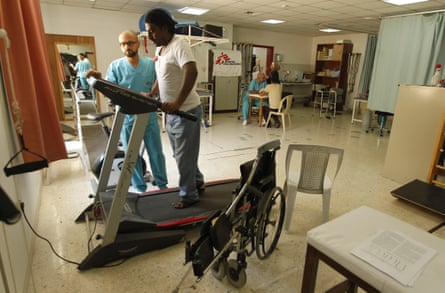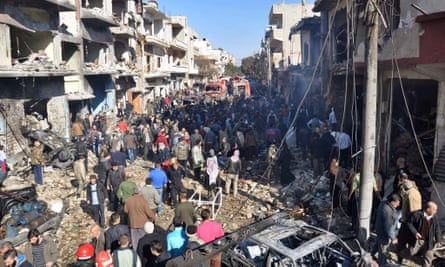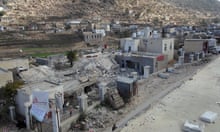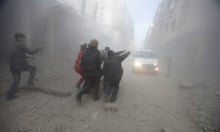In the room are two boys: one from Iraq, the other from Syria.
The Iraqi boy’s body was peppered with shrapnel when a car bomb detonated near the market where he was shopping with his brother. His brother died. The Syrian boy’s face bore the markings of burns – a fire that was sparked by a shell landing on the house next door spread to his family’s, and he was there.
Now they are both receiving treatment in Amman, the Jordanian capital, at this Médecins sans Frontières hospital, where the walls are covered with children’s drawings. “The children whose faces have been disfigured draw monsters,” said Talha al-Ali, a paediatric counsellor.
The Mowasah Reconstructive Surgery hospital is no ordinary hospital, for within its walls are housed war-wounded from around the Middle East, generations united by the joint trauma of witnessing and barely surviving an upheaval that has redrawn borders and destroyed the foundations of nation states.

Initially set up in 2006 as a reconstructive surgery hospital to treat Iraqis maimed during the US occupation of the country and the ensuing insurgency, it now provides a temporary home to those whose lives have been upended by conflicts in Syria, Yemen, the occupied Palestinian territories and even, for a time, Libya.
It is a microcosm of the region’s maladies and the trauma they have wrought on civilian lives – there are people here who have been wounded in sectarian bloodletting, shelling, airstrikes, occupation and crackdowns by dictators.
“From one day to the other, these people’s lives have been completely changed or destroyed, and we’re trying to offer them a second chance,” said Jean-Paul Tohme, who runs the day-to-day operations of the MSF hospital, at its new building opened in February.
The facility provides reconstructive surgery to the wounded, whether orthopaedic or plastic surgery, saying the practice is neglected in the region’s hard-hit nations, which lack the capacity for long-term care beyond handling emergencies.

“We are concerned about the long-term consequences of the war here,” said Marc Schakal, the head of mission for MSF in Jordan and Iraq. “These are long-term wars. In Iraq it’s been more than 10 years, in Syria it will be five years soon and we don’t see an end to this conflict. In Palestine, it’s been 60 years.”
Doctors at the hospital now do some 1,300 surgeries a year, and this year admitted 600 new patients, conducting more complicated procedures like flap surgeries, where tissues are grafted from one part of the body to another, complete with blood vessels.
It has also had unexpected advantages – a big part of the doctors’ work is battling infections, a process that has provided MSF with insights into antibiotic resistance. Over-the-counter antibiotic medication is widely available in the Middle East, and patients often self-administer the drugs without completing the courses, giving rise to widespread resistance among bacteria.
“The antibiotic we use here as a standard is the last line in Europe because we face so much resistance here,” said Schakal.
The Guardian interviewed four patients at the MSF hospital from Syria, Yemen, Iraq and Gaza. Their opinions do not reflect the official views of MSF.
Wael Samir – Yemen
Scarcely an inch on Wael Samir’s face is free of burns: 70% of his body was scorched one night in 2011 when he and his friends were sleeping in makeshift tents in Change Square in Taiz, part of an uprising against three decades of rule by the former president Ali Abdullah Saleh.
At 2am, said Samir, they awoke to the sound of shelling and fighting in the camp, only to walk into raging fires after government troops set the tents ablaze. “A lot of people died,” he said. “It was only a few of my friends who lived.”
Walking straight to a nearby mosque, he poured water on his burns, which only worsened them, before a doctor took him to hospital. Samir spent two years at a medical centre in Sana’a, the capital, before moving to the MSF facility, where he has now spent a year and a half and gone through some 20 operations.

Still, he smiles. He would like to return to Yemen, marry and reopen the family shop in Taiz.
That dream, however, may be further away than when Samir and his friends camped out to protest against Saleh’s iron rule, as well as corruption and endemic poverty and unemployment in the Arab world’s poorest country.
Yemen is now locked in a civil war between Saleh and his allies, the Houthis, Iranian-backed rebels from the country’s north, and a Saudi-backed coalition with allied militias on the ground seeking to restore the rule of the exiled president, Abd Rabbu Mansour Hadi.
It is a conflict that has killed thousands, displaced hundreds of thousands, and left millions in need of humanitarian assistance.
“I am saddened by what is happening to Yemen – the wars, the bombings, the destruction,” said Samir. “We saw Tunisia and Egypt, and the losses were minimal. Syria and Yemen have been utterly destroyed. But I do not regret going out because what we demanded was right. It was so that my younger brothers can have a good life afterwards.”
Yusuf Nsayrat – Syria
Yusuf Nsayrat sounds pained when he speaks, his breathing laboured, his arm wrapped ahead of an imminent operation. His arm was nearly destroyed by an explosive bullet.
Long before the Syrian revolution became a civil war, Nsayrat lived with his family in Daraa, a city in southern Syria where the uprising against President Bashar al-Assad was ignited by families protesting against the detention of their children in March 2011.
A month later, Nsayrat rushed outside to bring his children home, fearing they would get caught up in the melee of the day’s demonstrations. But then an explosive bullet shattered his hand. “I went out to get them and I was wounded,” he said.
After two operations in Daraa that replaced his shattered bones with metal plates, he fled the country to Jordan, where he eventually settled in the Zaatari refugee camp with his family. He was unable to use his arm, its muscles and tissues torn into shreds.
He endured the pain for four years, before being transferred to the MSF reconstructive surgery hospital. He spoke as he awaited another operation due the next day, an attempt to study whether the doctors could repair the nerves and ligaments in his arm.
Syria’s apocalyptic war has claimed more than a quarter of a million lives and displaced half the country’s citizens, including 4 million in neighboring Turkey, Lebanon, Jordan, and beyond, in Europe.
But less well known is the number of injuries and individuals maimed by the increasingly savage conflict. Just over half the patients in this hospital are Syrian: most of those who have arrived in the conflict’s latter months and years are victims not of bullets, but of airstrikes.
The Assad regime maintains aerial superiority, and has dropped inaccurate “barrel bombs” on areas controlled by the opposition, which have overwhelmingly killed civilians.
“I’m definitely saddened by what I see here of what is happening in the Arab world,” said Nsayrat. “We are all brothers here, and we pray that God rights these wrongs.
“This is our lot from God – he is testing us and I hope we pass the test,” he added.
Qa’qa’ al-Samarrai – Iraq
Qa’qa’ al-Samarrai’s face is bandaged, obscuring the entry and exit wounds left by a bullet that pierced his cheeks.
The former Iraqi police officer said he had been cursed twice – his name is Sunni Muslim, leading local Shia militiamen in the districts of Baghdad in which he lived to suspect he was collaborating with al-Qaida. They even kidnapped him for a spell.
The fact that he was a police officer, meanwhile, led local Sunni extremists to suspect him of collaborating with the authorities.
Militiamen stormed his home in May 2013, killing a friend and wounding his face, leaving him unable to eat properly or speak for months. “I wanted to kill myself,” he said. “I could not kiss my own child for a year and a half. I was deprived of my family, my face disfigured.”
His story illustrates the absurdity of the sectarian bloodletting that has tinged much of the region’s power struggles, and has effectively destroyed Iraq as a nation-state, now divided between a government-controlled region; Sunni areas in Nineveh and Anbar dominated by Islamic State (Isis); and autonomous Kurdish regions that are in effect their own state.
Samarrai is now wondering what comes after his stint at the hospital in Amman. He wants to go to a European country, stricken as he is with insomnia over fears that the militiamen will find him again. He opens his phone to show a threatening message, promising that he will not find safe haven by fleeing to Jordan.
“I wish I could leave,” he said, weeping. “I sometimes think of being smuggled out but then I fear the sea, that my young ones would drown. I swear to God, death is better. You are not in pain when you are dead.”
Najwa al-Ghardan – Gaza

In 2014, Najwa al-Ghardan set out with her eldest son and her baby, just a few months old, in a bid to leave their neighbourhood of Hijaziya in the Gazan city of Khan Younis. The mother of 11 feared that Israeli airstrikes, which had devastated the crowded city in that year’s summer war, would target nearby homes of suspected Hamas members.
Her son, carrying her baby, lagged behind. Then an airstrike struck the column of people leaving, killing many of those around her, and levelling homes on both sides of the road. “I didn’t even hear the strike, but it felt like fires were burning throughout my body,” said Ghardan from her wheelchair.
Shrapnel had peppered her chest, back, leg and stomach. She thought she was dying. But as the smoke cleared, she stood up, bleeding profusely, and searched for her children, who had survived but were pinned under a tree.
Other Palestinians arrived to help, rushing her to a hospital before she lost a critical amount of blood. Most of the shrapnel was removed, but doctors told her she might lose her legs. Ghardan’s father told her husband she might no longer be a suitable wife if she had a prosthetic leg.
Luckily she was transferred to the MSF hospital in Amman, where she had multiple operations to reattach the ligaments in her legs and to transfer tissue from other parts of her body. Now she can limp, but hopes to make a full recovery.
Her story is one that highlights the trials of life under occupation. Her children are still in Gaza, living off what little prospects there are under the blockade. Any money she doesn’t use from her 10.5 Jordanian dinars (£10) of humanitarian assistance a month goes to them.
Ghardan recoils when she recalls the violence at home, the tit-for-tat killings and the flaring of hostilities between Israelis and Palestinians.
“Son, who is happy with war? We want peace,” she said. “Everyone wants to leave because there is no life. People cannot work, employees don’t get salaries. How will they feed their children?”
Yet it is a testament to the latest upheavals in the Arab world that it is the Palestinian, long the subject of sympathy and solidarity from other Arabs, who now says the strife in the rest of the region fills her with pain.
“When I look at the others, it’s like a knife in my heart. What is the fault of this child, or this old man? This woman? I saw a child without legs. That child survived to live in pain,” she said. “Bombs are falling all over the Arab world.”







